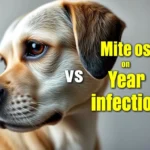
Recognizing worms in dog poop is crucial for maintaining your pet’s health. Many dog owners may not realize the frequency and impact of worm infestations, leading to misconceptions about their significance. Understanding the types of intestinal parasites that can affect dogs, the signs of infestation, and the appropriate treatments is essential for every pet owner.
Understanding Worms in Dogs
What Are Worms?
Worms are parasitic organisms that can inhabit the intestines of dogs, leading to various health issues. There are several types of intestinal parasites, including:
- Roundworms
- Tapeworms
- Hookworms
- Whipworms
These parasites can cause significant discomfort and health complications if left untreated.
How Do Dogs Get Worms?
Dogs can become infested with worms through several transmission methods:
- Ingestion of Contaminated Food or Water: Dogs can consume eggs or larvae from contaminated sources.
- Contact with Infected Animals: Interaction with other infected animals can lead to transmission.
- Fleas as Carriers of Certain Worms: Fleas can carry tapeworm larvae, which infect dogs when they groom themselves.
Environmental factors, such as poor sanitation and exposure to feces, also contribute to worm infestations. Regular cleaning of living areas and proper waste disposal can help reduce the risk.
Types of Worms Found in Dog Poop
Roundworms
Roundworms are one of the most common intestinal parasites in dogs. These long, spaghetti-like worms can grow up to several inches in length. Dogs can become infected through ingestion of eggs in contaminated soil or feces. Symptoms include vomiting, diarrhea, bloated abdomen, and weight loss.
Tapeworms
Tapeworms are flat and segmented, resembling grains of rice. They are typically transmitted through fleas, which dogs ingest while grooming. Symptoms may include visible segments in the dog’s feces, weight loss, and excessive licking of the anal area.
Hookworms
Hookworms are smaller but can cause significant harm. They attach to the intestinal wall and feed on blood, which can lead to anemia. Dogs can become infected through ingestion of larvae or through the skin. Symptoms include weakness, pale gums, and bloody diarrhea.
Whipworms
Whipworms are less common but still a concern. These worms reside in the large intestine and can cause severe irritation. Dogs typically become infected through ingestion of whipworm eggs in contaminated soil. Symptoms may include diarrhea, weight loss, and straining to defecate.
Other Less Common Worms
Other types of worms include lungworms and heartworms. While not typically identified in dog poop, these worms can lead to serious health issues. Lungworms affect the respiratory system, while heartworms affect the cardiovascular system.
Identifying Worms in Dog Poop
Visual Signs of Worms
When examining dog poop, it’s essential to look for visual signs of worms. You might observe:
- Appearance of Worms: Roundworms may appear as long, spaghetti-like forms, while tapeworm segments look like grains of rice or cucumber seeds.
- Other Indicators: Blood, mucus, or an unusual consistency in feces can also signal a problem.
Behavioral Signs of Worm Infestation
In addition to visual signs, certain behavioral changes can indicate a worm infestation. Watch for:
- Changes in Appetite: Increased or decreased appetite can be a red flag.
- Weight Loss: Despite normal eating habits, dogs may lose weight due to nutrient absorption issues.
- Changes in Energy Levels: Lethargy or unusual fatigue can be symptoms of worms.
- Other Behavioral Changes: Excessive scratching, licking, or distress may also indicate a problem.
Diagnosing Worm Infestations
When to See a Veterinarian
If you notice any of the symptoms mentioned, it’s crucial to see a veterinarian promptly. Regular check-ups are also essential, as many worm infestations can occur without visible symptoms.
Diagnostic Tests
Veterinarians typically perform a fecal examination to diagnose worm infestations. This process involves analyzing a stool sample for eggs or larvae. Other diagnostic methods may include blood tests or imaging techniques to assess the overall health of your dog and rule out other conditions.
Treatment Options for Worms in Dogs
Veterinary Treatments
Veterinary treatments are crucial for effectively addressing worm infestations. Common deworming medications include:
- Fenbendazole: Effective against roundworms, hookworms, and whipworms.
- Praziquantel: Primarily used for treating tapeworms.
- Ivermectin: Often used for heartworm prevention and treatment.
The duration and frequency of treatment will depend on the type of worm and the severity of the infestation. Always follow your vet’s advice regarding medication.
Home Remedies and Preventative Measures
While some pet owners may consider home remedies for treating worms, it’s best to consult a veterinarian first. Many home treatments lack scientific backing and may not effectively eliminate the problem. Veterinary guidance is essential to ensure the safety and well-being of your pet.
Preventative Care
Regular deworming is vital in keeping your dog healthy. Vaccinations and health checks can also help prevent worm infestations and detect any issues early. Discuss with your vet the best schedule for deworming and vaccinations based on your dog’s lifestyle and needs.
Preventing Worm Infestations
Good Hygiene Practices
Maintaining a clean environment is crucial in preventing worm infestations. Consider these practices:
- Keeping Living Areas Clean: Regularly clean your dog’s living space and remove any feces promptly.
- Managing Waste Disposal: Dispose of waste in a safe manner to reduce exposure to parasites.
Proper Nutrition
A balanced diet plays a significant role in preventing infestations. High-quality dog food can boost your pet’s immune system, making it more resilient to parasites. Consult your veterinarian for recommendations on the best dog food for your pet.
Regular Vet Checkups and Testing
Regular vet check-ups are essential for monitoring your dog’s health. It’s advisable to conduct fecal testing at least once or twice a year, depending on your dog’s risk factors. Staying updated on vaccinations also plays a critical role in overall health.
Frequently Asked Questions (FAQs)
How often should I check my dog’s poop for worms?
Regularly checking your dog’s poop, especially after walks or playtime outdoors, is a good practice. Aim for at least once a week, and consult your vet if you notice any unusual signs.
Can dogs spread worms to humans?
Yes, some types of worms can be transmitted to humans, particularly roundworms and hookworms. Practicing good hygiene, such as handwashing after handling feces, can help prevent transmission.
Are there any specific breeds that are more susceptible to worms?
While all dogs can get worms, certain breeds may be more prone to specific types due to their lifestyle or living conditions. Discuss your dog’s risk factors with your veterinarian.
What should I do if I find worms in my dog’s poop?
If you find worms in dog poop, it’s essential to schedule a visit with your veterinarian as soon as possible. They will perform the necessary diagnostic tests and recommend the appropriate treatment.
Conclusion
Understanding worms in dog poop is vital for every dog owner. By recognizing the signs, knowing the types of worms, and learning about treatment and prevention, you can help keep your furry friend healthy and happy. Regular veterinary check-ups and good hygiene practices will go a long way in preventing infestations and ensuring your dog’s well-being. If you have any concerns, don’t hesitate to reach out to your veterinarian for guidance.









